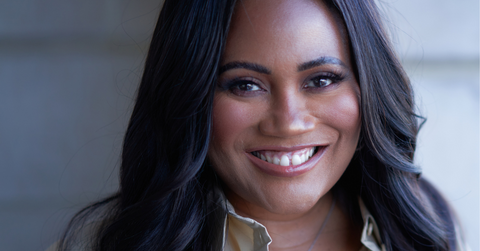To garner the confidence of music legends like Whitney Houston and Bobby Brown is no small achievement. For over two decades, Tracey Baker Simmons has upheld this trust, defying industry norms and setting a standard rarely seen in Hollywood.
Hailing from Chattanooga, TN, her journey in entertainment spans 25 years. She reshaped the landscape of reality TV with her groundbreakingly authentic show “Being Bobby Brown,” which premiered in 2005. Long before the era of social media, Tracey unlocked a new avenue for storytelling, driven by her passion for documentaries and the belief that everyone, including celebrities, deserves the chance to share their truth.
Today, the Emmy-nominated producer is a self-proclaimed gate-opener and opens doors for the next generation through her platform, Reality TV Decoded, and producer masterclass. We had the opportunity to chat with Tracey about her journey and navigating the world of entertainment.
Her Agenda: Tracey, your career spans over 25 years in the entertainment industry, with notable contributions to reality television. Could you share with us how you initially found your way into this industry and what motivated you to transition into reality television?
Tracey Baker Simmons: I started in the music side of the industry, working initially as an intern and then working in marketing and promotions with Warner Brothers. And then I segued from that into doing music videos and commercials and gained a lot of production knowledge from that experience. And then, moving into commercials, the job was a little easier because someone else was coming up with the ideas, and they were giving us the boards to shoot. However, it still gives you a full scope of telling stories in a short amount of time, which hones your storytelling skills.
I came up with the idea of doing a show like “Being Bobby Brown,” which was really just an idea that I had from seeing them on the news and hearing about them in the community. I lived in Atlanta at the time, it seemed not a natural segue because reality was still very new. We had “The Osbournes” and “Newlyweds: Nick and Jessica,” and a couple of other things, but we really didn’t have this breadth of reality shows. Bravo had a show they were just about to air, “Queer Eye,” and it was even before the Housewives [franchises]. My producing partner and I at the time just played a little game of six degrees of separation and were able to connect with Bobby and Whitney, whom we did not know at all. And then from there was able to create the show. We had a private investor, created the show and then licensed it to Bravo.
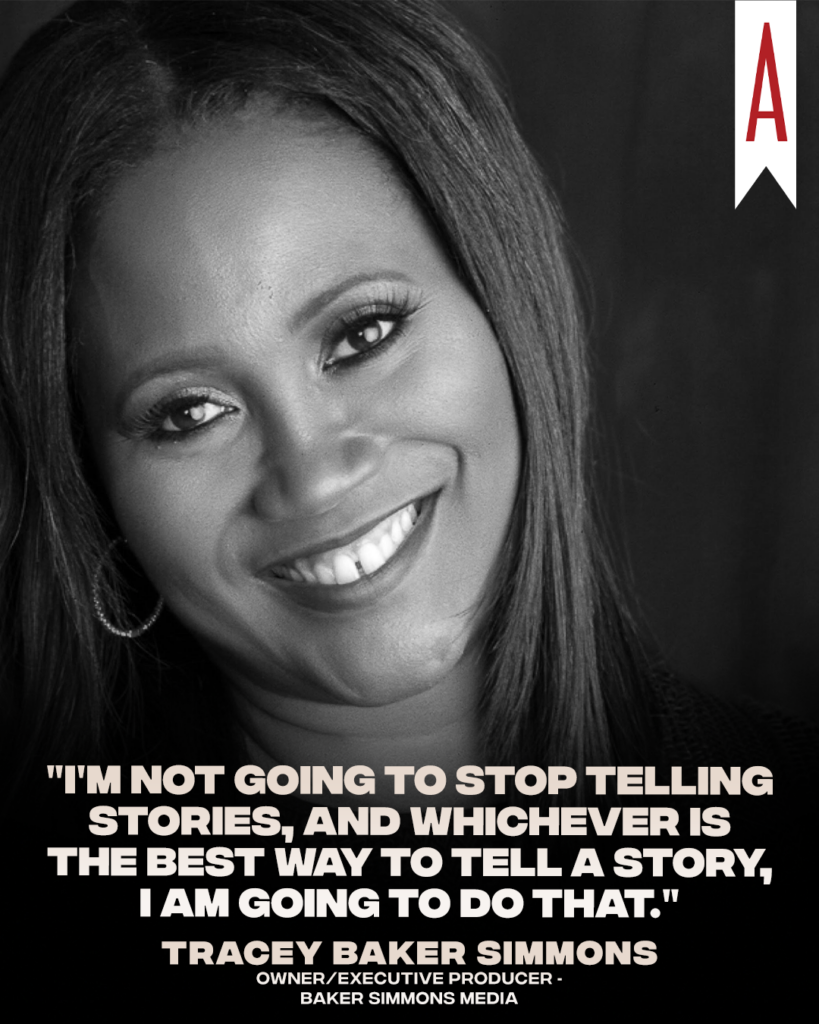
Her Agenda: Like you said, “Being Bobby Brown” was definitely groundbreaking at the time because it was a reality television prototype in a lot of ways. What were the challenges you faced in creating such an intimate and raw portrayal of their lives, and how did you navigate them?
Tracey Baker Simmons: One of the biggest challenges was [staying] authentic. You had these two mega stars, and we took a big risk. We had an investor, so it wasn’t like a network gave us the money and said, ‘make the show.’ We were making the show and then going to hope and pray that we found the right distributor with meaning, the right partnership, and being allowed the right space actually to navigate how the story would be told.
Her Agenda: What responsibility do you think producers have to audiences when producing unscripted content?
Tracey Baker Simmons: I feel like being honest and authentic is important. It’s important to me. I have to be able to sleep at night, and I just have this thing about not being authentic and not being honest. Sometimes, in our space, people like to blindside people or say they know something, and they put you in a position where someone else is sharing that or putting you on the spot and things like that. People deserve the opportunity to own their truth. That’s a big deal to me. And even on the scripted side, I do also feel like oftentimes people don’t think about messaging. Messaging is everything. And I think we miss that opportunity a lot to draw back sort of and [think], ‘what am I saying?’
And I have been guilty of it, even when doing the “Being Bobby Brown” show. I met a husband and a wife who happened to be megastars. They were very forthright. They were honest and authentic. I didn’t think that people would be like, ‘oh, they must’ve been high, or they’re this, or they’re that.’ Because that wasn’t even true. They weren’t high on camera when we were shooting the show. They’re just entertainers and they have the ability to turn it off and on when the cameras are off or on because that’s what they did for a living. And then to think about 20 years ago, literally 20 years ago to this month, was when we started actually shooting that show. There wasn’t a Cardi B, there wasn’t social media, there wasn’t living out loud to that level. So people only had this marketing perception of Whitney Houston and they didn’t personally know her. They had never seen her on her Instagram being silly at home. And she can still pop on a stage looking like a superstar and belt better than anybody on the planet.
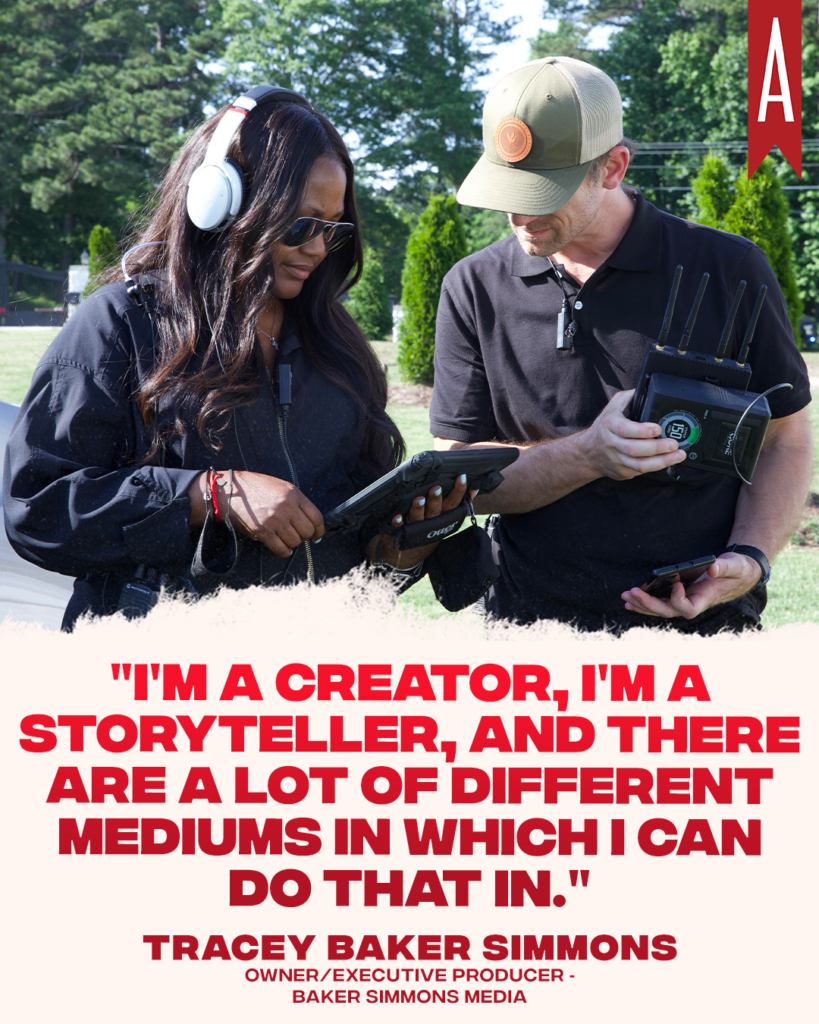
Her Agenda: With your knowledge and experience of packaging, selling, and producing, what advice would you give to aspiring producers looking to break into TV, whether reality or scripted?
Tracey Baker Simmons: I grew up in the Michael Jordan era, and he would always say, ‘to thine own self, be true’ and ‘master the craft.’ I hate it if people say, ‘I have a show,’ and I ask, ‘What are you watching?’ And they say, ‘I don’t watch TV.’ How can you make TV? So I would say, first and foremost, watch television.
If you want to be in TV, watch TV. If you want to be making movies, go to the movies a lot, watch and see the great people who are winning awards or having repeated shows, what are they doing? What does it look like? Honestly, I didn’t know anything about making a show. I just watched “The Osbournes” and was able to connect the dots of what was the best approach. [Next], get as much experience as you possibly can, even if it’s shadowing someone or interning. I don’t think I’ve ever had an intern that didn’t end up getting a job. I think internships are still very key. They’re a good way to get in. They’re also a good way for you to look at the landscape and sort of figure out, I like this, or I like that, because sometimes we don’t know for sure which area you want to be in. Do I want to be creative? Do I really like numbers and I just want to be on the production side, or do I really just want to be working in the camera department? Or maybe there are people who are talent producers and they just love dealing with humans and coddling them and getting them comfortable to do what it is that they need to do. And you really can find that out by planting yourself as close to any and everyone that you possibly can in the industry and then sorting what you feel you naturally gravitate to.
Her Agenda: Serving on the ECCO media committee under the Obama Administration is quite impressive. How did your experience in this role influence your approach to media production?
Tracey Baker Simmons: The [ECOO media committee experience aligned] with my mantra ‘media influences culture.’ [The committee] was there because they wanted us to have information that we could actually put into our everyday storytelling, whether it was a TV series or making small videos. I always liked history and politics, so that really was a big interest to me to just be in that space. But it also ignited me to see there’s a bigger responsibility. This is fun; this is amazing. It’s creative. You are telling stories, but there are things bigger than that and what’s happening in our country, what’s happening with our government, also is important. And the fact that media influences culture and messaging really is impactful. The messaging or information that we [share] to the everyday public through television and film, can really change the scope of what’s happening in our country. As a creator, you do have a level of responsibility. The more you grow in the [media] space, the bigger your responsibility should become. I think it made me definitely think more about messaging in a bigger way than I had in the past.
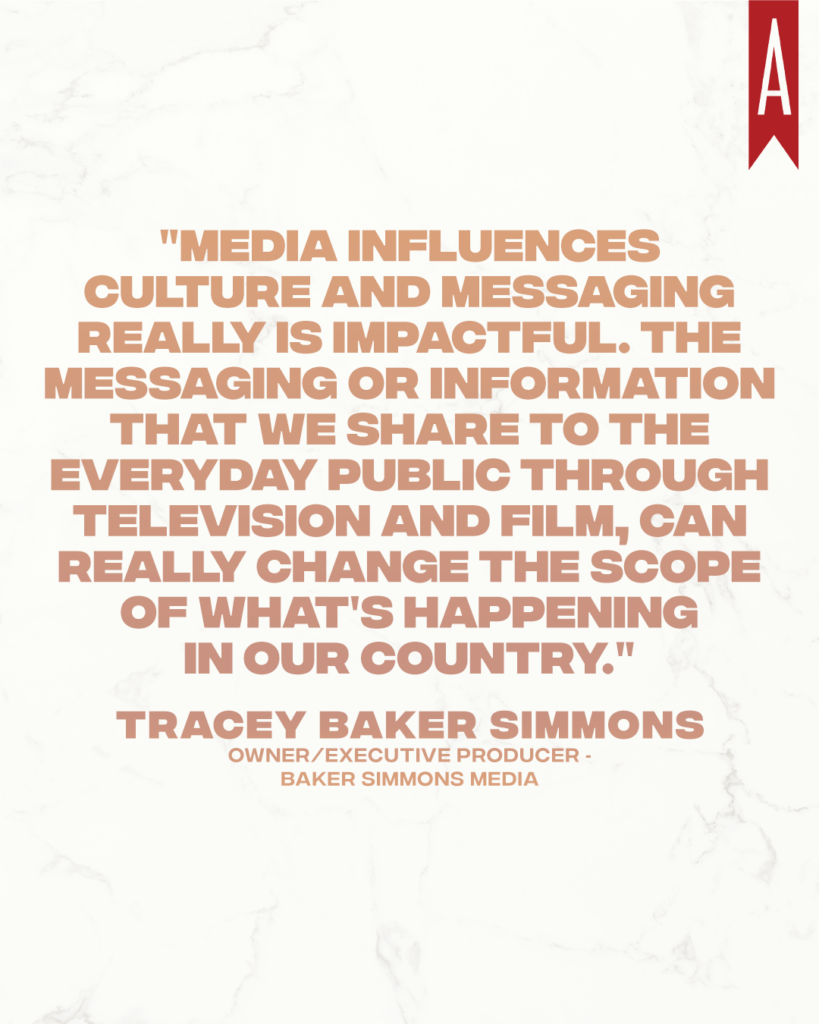
Her Agenda: Is there a specific project or moment in your career that you consider particularly defining or impactful, and what lessons did you learn from it?
Tracey Baker Simmons: Of course, the Bobby Brown [show] was definitely defining and impactful because, before that, I was doing music videos and commercials. I honestly was looking to go directly to scripted television, but taking that detour to do that particular show, I then became a pioneer in this space of non-scripted or reality television. So definitely, it was defining because, I mean, think about it: it’s Whitney Houston and Bobby Brown, and they’re icons. And it’s an honor because you have to build trust to be able to do that show. There was an immense amount of trust that had to be built between them with us as producers, and honestly, we own that show, and we own that footage. And to this day, 20 years later, we still have not betrayed the trust that she had in us and how we navigated that footage, how we maintain it, what pieces of it we share with others, and now she’s gone, her daughter’s gone. So we also have some of their greatest family memories at the same time.
Her Agenda: What do you envision for the future of reality TV?
Tracey Baker Simmons: Honestly, I feel like it’s interesting because we’re in this space where reality has sort of slowed down a bit, but I think that it’ll get a rebirth. As documentaries are starting to blossom even more, which is a space where people are usually very raw and authentic and everything, nothing’s produced. Yes, you can do interviews and ask questions, but you’re definitely not manipulating the story. I do feel like we will go back to more of that type of storytelling. I think people, because of the fact that we do see people in social media and we’re seeing them as their authentic selves, they’re overproducing a show, it only loses its credibility with the audience. So I do feel like we’re going to get back to more raw concepts and more verite type of storytelling where the audience can connect because it feels so real and it doesn’t feel like you’re watching a telenovela or something.
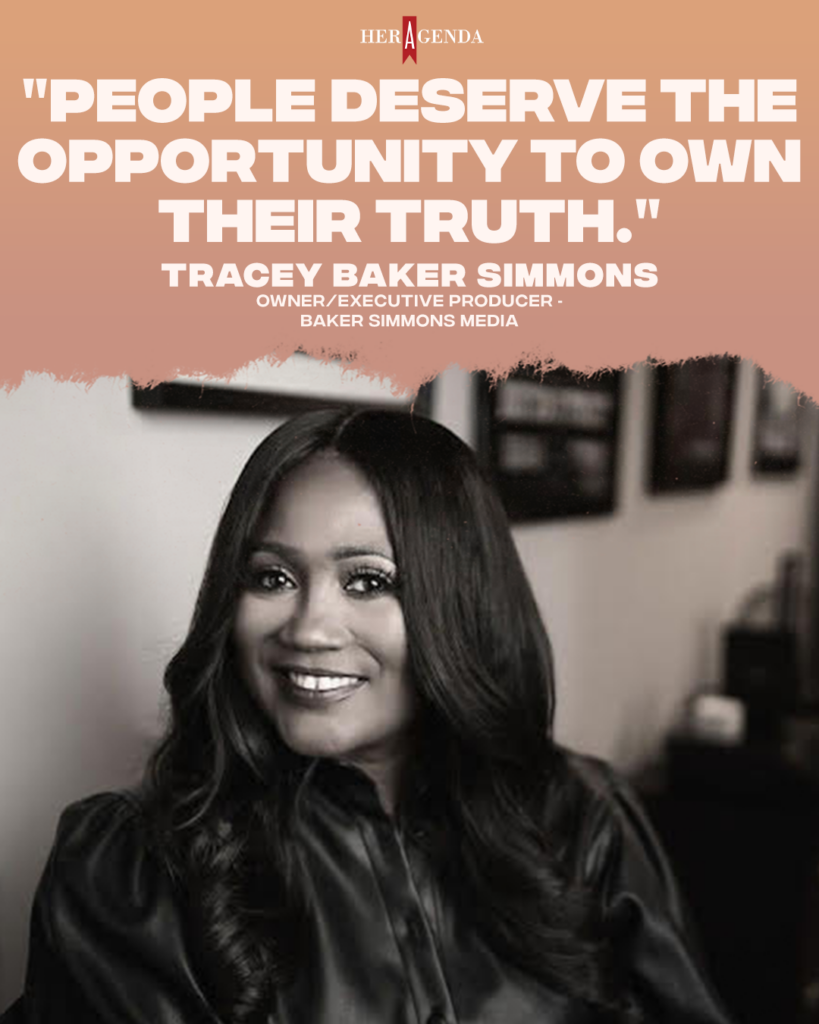
Her Agenda: And then, looking ahead, do you want to continue to focus on unscripted, or do you want to get into scripted? What’s next?
Tracey Baker Simmons: I’m happy that we live in a world now where people could be multi-hyphenated, which was weird when I started doing reality TV. Now you can do everything. You can do scripted one day, and you can do non-scripted another day. I did a Christmas movie for Hallmark. I’ve done a biopic, and I finished a documentary recently for Showtime on women in hip-hop. And I’m happy that what I am is a creative. I’m a creator, I’m a storyteller, and there are a lot of different mediums in which I can do that in. And there are a lot of different genres in the industry where I could do that. And I’m loving and embracing the idea that that’s possible. I’ll make a big movie someday that will be released in a major theater. I’ve done an independent film before. I will be doing scripted television and I will be able to bring all of these experiences with me as well. When I did the Christmas movie for Hallmark, I really was able to bring some of my reality chops to the party as an executive producer. And it was interesting to watch me be able to do that and impart that. And so I feel like, for me, the sky’s the limit. I’m definitely going to be doing it all because I’m not going to stop telling stories, and whichever is the best way to tell a story, I am going to do that.
Her Agenda: What is your motto?
Tracey Baker Simmons: Nothing is impossible with God. It really is first thinking it’s possible and then doing it.
[Editor’s note: This interview has been edited for length and clarity.]

